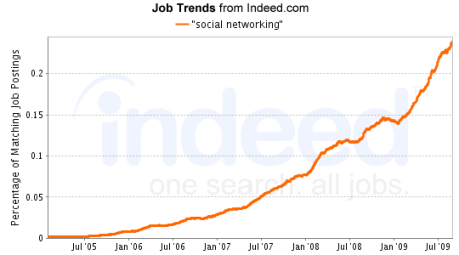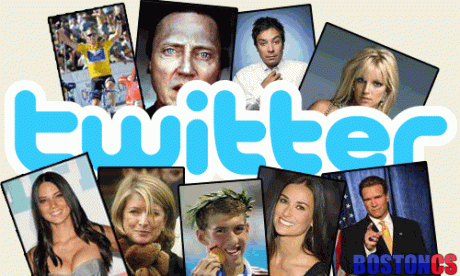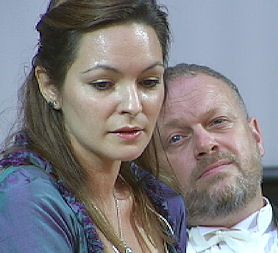Tweet For Your Supper
October 21, 2009
The article “Comcast: Twitter has changed the culture of our company” provides interesting anecdotal evidence of a trend that could change the nature of employment for future generations.
According to Comcast CEO, Brian Roberts, Twitter has – as you may have already guessed – changed the nature of his company.
“Comcast has for a while now been using Twitter to scan for complaints and engage with customers. The idea was not his, but rather rose organically when someone in the company realized that a lot of public complaints were being sent over Twitter.”
Now the company employees people specifically to work on the site:
“Frank Eliason (Comcastcares on Twitter), now has 11 people working under him simply to respond to information about Comcast being broadcast on Twitter.”
Interest from younger generations in traditional communications and entertainment models is fading fast, while they flock to the internet and websites like Twitter and Facebook. Companies are guaranteed an immediate, engaged and active audience.
This could be a very good thing for the younger generation. Tides of young people are graduating in an increasingly hostile economic environment, and such websites could generate a multitude of new jobs – jobs which offer opportunities for graduates to be innovative and creative. Moreover, the younger generation have grown up with these websites – they already have the skills they need to exploit the websites – from hours spent networking with friends and family.
However, this raises other issues, particularly in areas like the ‘digital divide’. Are people that cannot afford the technology going to become increasingly marginalized in a new media society? Will Generation X struggle to produce marketing campaigns that are relevant to a younger generation or will they thrive and adapt?
If things continue the way they are going, this graph suggests such problems could prove to be pivotal for people looking to make the move into the workforce over the next decade:
Credit: Indeed.com
Phishing For Passwords easy as 1,2,3.
October 7, 2009
The big news of the past week has been the large scale security breach of popular email service Hotmail. Last Thursday, more than 10 000 usernames and passwords were posted by an anonymous user on pastebin.com (Hacker leaks thousands of Passwords, Says Site).
What the incident shows is not so much the vulnerability of Hotmail’s servers, however, but how very security un-conscious its users are.
According to this article ‘Hotmail phish exposes most common passwords“:
“The most common single password in the sample of 10,000 purloined Live ID login credentials posted as a text file to developer site PasteBin.com was “123456”, something only marginally more secure than the traditional favourite “password”.”
“Nearly half (42 per cent) of the passwords used only lowercase letters, 19 per cent were purely numeric and only six per cent mixed up alpha-numeric and other characters, according to a separate analysisof the data by web application security firm Acunetix.”
In an online world where cyber crime and phishing scams are so prevalent, it is hard to believe that people are still so laissez faire about their online security. I would argue that people still greatly underestimate the dangers posed by online crime.
According to the article “ID Theft has hit 20% of Aussies”
“A fifth of Australians have fallen victim to online identity related crime as criminals use low-tech means like snatching mail to commit the fraud, a report has found.
More than 1.5 million Australians had credit cards illegally copied in the past year, and 1.2 million had bank accounts illegally accessed, the Veda Advantage Identity Crimes Report, conducted by Galaxy Research, showed.”
Research shows it’s Generation X that are the most lax about their security. Perhaps Baby-Boomers are more suspicious online, or use online services such as online banking less frequently because the internet still holds a foreign quality to them. Generation Y are constantly being warned about the dangers of the online world and are more internet savvy – I think you would find Generation Y could detect a phishing scam within moments of looking at an email, while someone a little older might see the name of the corporation they trusted and think nothing of it.
According to the article:
“I think (the 25 to 49 age group) are more casual. I think its some ‘it won’t happen to me’ thinking,” Kirk said. “But if they ask their family and friends, they’ll find out that family and friends have had their identity stolen. It’s massive.”
If phishing is now the great new security threat of the 21st century, more time and money needs to be spent educating people on how they can combat these dangers in their online use. And the starting point needs to be a good, solid password for your important accounts – 123456 just doesn’t cut it.
Celebrities Undone By Twitter
October 7, 2009
Twitter tells us everything we didn’t want to know about a person. You get to see the good, the bad and the ugly – intimate knowledge that would take years to achieve through a friendship can be gleaned in a single click.
Which is why Twitter might actually be a curse for the world’s celebrities.
Public relations agents carefully craft public statements, choose designer outfits and airbrush photos of their clients. We are made to feel that celebrities lead a fantasy existence that is far out of reach to most of us mortals.
However, all this painstaking work can be undone in a single, untimely tweet.
According to an E! Online Article: “Is Twitter Totally Overt For Celebs”
“Hung’s Jane Adams (a doll we totally love) was caught dine-and-dashing at Barney Greengrass restaurant recently, via her stilted waiter’s Twitter account. Tsk-tsk, babe!”
Of course, when you take the same concept and apply it to YouTube and politics, the issues are a little more serious and the fallout even greater:
BET Co-Founder Apologizes for Stuttering YouTube Attack.
N.B After writing this post, a few weeks later this article – “Actors banned and censored on Twitter by Film Studios” surfaced. Basically, it seems that major studios are cracking down on how much their actors use twitter:
“actors have new clauses in there contracts that prevent them from using social media sites. The Hollywood Reporter, Esq. blog reports that both Disney and Dreamworks have already added the clauses to their talent contracts.”
They may be adamant that this is simply to prevent important information from ‘leaking’ but I would suggest there is more at stake than that. It seems that companies with a ‘family friendly’ image are worried that their squeaky clean teen stars – Miley Cyrus and so on – could be tarnished by a wayward Twitter post.
Photo: Lafayette Twestival 2009
Faithbook
October 7, 2009
In light of the recent controversy over freedom of religion in Australia, I thought it would be interesting to delve into how religious debates have been played out in the cyber realm.
Some groups have embraced social networking sites as a way to reconnect with a disaffected and secular youth culture.
Take ‘Faithbook‘ for example:
“A new group called Faithbook hope that they can use the social networking site to improve relations between different religious communities.”
“The Faithbook project was created by Rabbi Shoshana Boyd Gelfand of the Reform Judaism movement with the aim of promoting debate and constructive dialogue amongst different religions and developing interfaith relations.”
Certainly the opportunity for dialogue between various religious groups and discussion of religious issues is a good thing. Such discussion can increase tolerance and prompt people to reconsider their own views, discarding them in light of new evidence or becoming stronger in their beliefs from reevaluating them. Now that schools and other similar institutions are increasingly become religion-free zones, the internet could be an excellent forum to continue these discussions.
However, in my experience, discussions of a more serious nature on Facebook often disband into petty arguments, chaos and ‘flaming‘.
Perhaps there is a need for greater moderation of internet forums to protect those of any belief from having their views attacked and or ridiculed by users who can hide behind a cloak of anonymity.
Religious leaders, such as Rabbi Dov Greenberg, are skeptical however, about the possibilities of real, constructive religious discussion online:
“Facebook and all electronic communication is less personal, and it is harder to connect,” Greenberg said. “Facebook is a wonderful tool to advertise the events, but it is not the best venue to discuss them.”
Quote Courtesy of ‘”Faith and Facebook: When Social Networking and Spirituality Collide“.
Tweet What You Eat
October 7, 2009
No more Jenny Craig, Atkins or Diet-Coke and Lettuce Leaf diets. The newest fad to sweep the dieting world is ‘Tweet What You Eat‘, an online way of tracking how many kilojoules you consume in a day.
Basically, Tweet What You Eat is an online food diary where each day you enter every single thing that you eat. There is a database with the approximate kilojoule value of most foods – so you can keep track of how many kilojoules you’ve had in a day. Not only are your dieting successes and failures laid out in front of you – but are available for all online members to see. Not to worry though: there is forum to pool dieting tips and get advice.
The Telegraph claims that the application has more than 8,000 followers:
“including Stephen Fry, who has reportedly lost six stone in six months, and Little Britain star Matt Lucas, who says he has lost half a stone in a fortnight.”
I did a bit of research, and according to the article Weight Loss: Bad Habits that Pile on the Fat, the two biggest problems for dieters are:
1. Underestimating how much you’ve eaten
Studies show overweight people tend to underestimate significantly how much they eat, and the bigger their portions, the more their calorie calculations go off track.
2. Discounting the effects of peer pressure
Findings from the Framingham Heart Study reveal that when one person in a family or network of friends gains weight, others tend to gain weight too, perhaps because it becomes more socially acceptable to be chubby.
Tweet What You Eat addresses both of these problems which is perhaps why its popularity has become so immense in such a short time since its inception.
Whether it will have long term success once the novelty wears off is debatable. It certainly demonstrates however, that more and more of our everyday life is taking place on online.
It’s a Woman’s World
October 1, 2009
According to the article ‘Women Outnumber Men on Social Networking Websites’ , women are much more frequent users of social networking sites then men:
“Females outnumber guys 2-1 across a host of websites, and more than half of Facebookers and Twitterers are women, informationisbeautiful.net figures show.”
Interestingly, this was not blanket trend however;
“Digg is a boy’s club – 64 per cent of its users are male. LinkedIn and YouTube had an equal number of male and female members.”
Why are women so much more prominent on Facebook, Twitter and MySpace?
Image: Postmagusa.Com
Well obviously women are great talkers – and studies have shown women enjoy sharing about their subjective experiences and personal lives more than men. This is one of the main purposes of Facebook.
However, I still find the figures suprising considering that studies have shown men spend more time online than women. Also, websites like Facebook are methods of building business relationships and keeping in touch with family and friends, which I would have thought would be things equally valued by men and women. What I would have expected to have seen was equal numbers of men and women as members on these websites, but perhaps men using the site to write shorter comments, less frequently than women.
Perhaps men find the very public nature of Facebook more confronting than women or prefer to use websites that demand less engagement from the user.
If this trend continues, maybe the future will see the development of male-oriented websites that can cater to their different needs and natures in navigating online networking.
‘Little but Often’ or ‘Zero Tolerance’ for workers?
October 1, 2009
At a recent work experience placement at a local newspaper, I noticed the journalist sitting next to me would intermittently flit to her Facebook news-feed between phonecalls. (Or while on the phone if it was a particularly dry interview).
Such is no surprise. Doesn’t everyone use their Facebooks/Twitters/MySpaces (for the old-fashioned) at work these days?
Apparently not. According to this Computerworld Article , 54% of US companies have instituted a total ban on use of social networking sites during working hours.
Said Dave Willmer in the article:
“Using social networking sites may divert employees’ attention away from more pressing priorities, so it’s understandable that some companies limit access,”
This news startled me somewhat. I was sure a few months back I had read articles extolling the benefits of employees using these sites (albeit infrequently) at work.
Sure enough, here was the “Read Write Web” article I had read:
“A new study just published by Australian scientists found that taking time to visit websites of personal interest, including news sites and YouTube, provided workers a mental break that ultimately increased their ability to concentrate and was correlated with a 9% increase in total productivity.”
Of course there are limits to this:
“…within a reasonable limit of less than 20% of their total time in the office.“
Either American workers are spending much more than their allotted time on Facebook or CEO’s are misguidedly taking a zero-tolerance approach when they really should be adopting a “little-but often” mantra?
From my own experience, a little time on Facebook at work does offer you the opportunity to rest your brain from the rigours of work. However, for me, it also allows a sense of connection to the outside world while you are glued to your desk.
In fact, there does seem to be a bit of psychology behind why social networking sites are beneficial at work. This article offers ‘5 reasons why Social Networking Websites Increase Productivity at the Workplace’.
It suggests technology is “the new cigarette break”, and brings “‘life into the workplace” . This acts as an antidote to growing resentment at long working hours and less time spent with friends and family.
You don’t need to rush home from work to plan your night out as “employees can now access social networking sites to make arrangements, plans and dates during the day”.
The writer also suggests that social networking can benefit the business, forging links between employees and allowing for business networking.
Off to go and check my news feed – guilt free.
Combining Twitter + Tosca Puccini
September 6, 2009
Songs lyrics hailing to broken Myspace romances (I couldn’t help but laugh at the line ‘internet grass is always greener’), television shows flaunting Facebook aficionados. No doubt, social networking websites have long since made their bumbling debut into the realms of popular television and music.
But curiously, it seems high culture has not been immune to these internet phenomenons.
Credit: Channel Four News
Yesterday saw the launch of the first ‘Twitter opera’, comprised solely of the contribution of Tweets from random users to a single Twitter webpage.
“…the volume of tweets has generated enough content for a seven-act opera, said ROH spokeswoman Sara Parsons.”
Whether the opera will gain the accolades of the critics, only time will tell. The first reviews are only just starting to come in.
I personally have mixed feelings about the idea. Full marks for creativity, but at the same time, it feels like the phenomenon of the internet has invaded just about every aspect of our old lives, to the point where nothing is sacred.
At the moment, it looks as though a sequel is not out of the question – so if you fancy yourself a budding composer, you can contribute your tweets at: www.twitter.com/youropera
You Can’t Buy Friendship
September 5, 2009
Or can you?
Brisbane- based firm uSocial.net has been selling ‘lonely’ Facebook users friends; but for no tidy sum. You can pick up 1,000 cyber buddies for a hefty fee of 177 dollars.
However, the deal is slightly more sinister than simply boosting the self esteems of those who find themselves suddenly lacking in wall posts.
The service is targeted at expanding marketing opportunities for those looking to profit off their pages.
The Usocial website reads:
“the simple fact is that with a large following on Facebook, you have an instant and targeted group of people you can contact and promote whatever it is you want to promote.”
So, are Usocial ingenious entrepreneurs or shrewd charlatans?
Facebook seems to have pinned them the latter.
According to the article ‘Buying Facebook Friends Could Get You Banned’:
“Facebook fired back against uSocial on Thursday and issued a reminder that it was against its terms of service for a user to access an account belonging to someone else or to share a password.”
“It’s our understanding that uSocial logs in as a user and manipulates their account,” the Palo Alto, California-based company said. “This is a violation of our terms by uSocial and any user who participates in their programs”
There have been a legion of bloggers complaining about the behaviour of Usocial. Here is one more detailed post you can read. And rightly so. Falsely bolstering the popularity and marketing base of their clients is unethical marketing at its worst.
At the same time, if Facebook are free to plaster people’s walls with targeted advertisements, surely it is a double standard if they attempt to stop companies like this trying to have their share of the pie?
Photo: Flickr/Creative Commons





